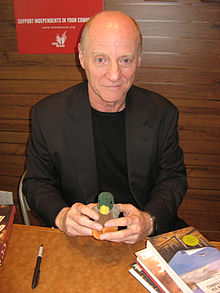Jonathan Carroll
| Jonathan Carroll | |
|---|---|

Carroll at a reading in Stacey's Bookstore,
San Francisco, in 2008 |
|
| Born | Jonathan Samuel Carroll January 26, 1949 New York City, US |
| Occupation | Novelist, writer |
| Nationality | American |
| Genre | Magic realism, slipstream, contemporary fantasy |
| Website | |
| www |
|
Jonathan Samuel Carroll (born January 26, 1949) is an American fiction writer primarily known for novels that may be labelled magic realism, slipstream or contemporary fantasy. He has lived in Austria since the 1970s.
Carroll was born in New York City to Sidney Carroll, a film writer whose credits included The Hustler, and June Carroll (née Sillman), an actress and lyricist who appeared in numerous Broadway shows and two films. He is the half brother of composer Steve Reich and nephew of Broadway producer Leonard Sillman. His parents were Jewish, but Carroll was raised in the Christian Science religion. A self-described "troubled teenager," he finished primary education at the Loomis School in Connecticut and graduated with honors from Rutgers University in 1971, marrying artist Beverly Schreiner in the same year. He relocated to Vienna, Austria a few years later and began teaching literature at the American International School, and has made his home in Austria ever since.
His first novel, The Land of Laughs (1980), is indicative of his general style and subject matter. Told through realistic first person narration, the novel concerns a young schoolteacher, Thomas Abbey, researching the life of a favorite children's book author of his youth, which involves meeting the author's daughter in her and her late father's seemingly idyllic home town of Galen, Missouri. Everything seems fine until a dog in Galen begins talking to Abbey. The line gradually blurs between the fantasy world created by Abbey's research subject and the life of the people in Galen, while the reader begins to wonder just how much trust can be placed in this narrator. Subsequent novels would expand on these themes, but often contain unreliable narrators in a world where magic is viewed as natural. (One commentator claimed in The Times that "if he were a Latin American writer with a three-part name, his books would be described as magical-realist".)
...
Wikipedia
